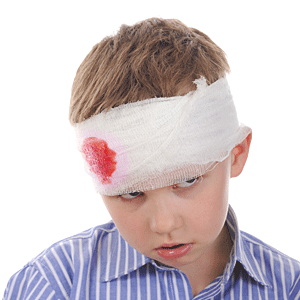
Children who have suffered a concussion or other head injury seem to have a much higher-than-average rate of depression, says a new study.
Using data from a US health survey, researchers found that children and teenagers who'd ever sustained a brain injury were much more likely to have been diagnosed with depression.
The researchers said 15% had been diagnosed with depression, while the national prevalence was less than 4%.
The finding does not prove that kids' head injuries caused the depression, said Keith Yeates, a paediatric neuropsychologist.
Brain injury
He heads the paediatric psychology and neuropsychology units at the Nationwide Children's Hospital in Columbus, Ohio.
There have been some small studies of children, but the findings have been more mixed, according to Yeates. While this latest study doesn't prove cause-and-effect, it does support an association between brain injury and depression in kids, he said.
It's not clear why the link exists, Yeates noted, but even so he thought doctors should assess children for behavioural problems and mood symptoms, including depression and anxiety, as part of their follow-up after a head injury.
National rate
Dr Matthew Wylie, a paediatric emergency specialist who led the study, agreed. "It's helpful for paediatricians to recognise that there is this potential for depression and to be attuned to it."
The results are based on a 2007 nationally representative study covering nearly 82 000 children and teens younger than 18.
Just more than 2 000 parents said their child had been diagnosed with a "brain injury or concussion," and just over 3 100 said their child had been diagnosed with depression -- a national rate of 3.7%.
Among kids with a past head injury, however, the rate of depression was about four times higher, at 15%, the investigators found.
The researchers then weighed other factors in children's depression risk, such as family income and mothers' mental health. In the end, kids with a history of head injury still had double the risk of depression as other kids.
Depression risk
The study had a number of limitations, both Wylie and Yeates pointed out.
One is that "brain injury" and "concussion" were lumped together into one question, Yeates noted. So it's not possible to tell whether kids who suffered mild concussions had the same depression risk as those with more serious brain injuries.
It's likely that more severe injuries would carry a greater risk, Wylie said, but that's a question for future studies, he added.
More informationThe US Centres for Disease Control and Prevention has more on concussion and other brain injuries.
Photo of child with wound from Shutterstock.




 Publications
Publications
 Partners
Partners














